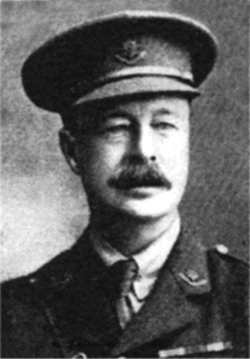Lieutenant-Colonel George Charles LAMBTON, D.S.O., O.B.E.
Commanded the 2nd Battalion Worcestershire Regiment from February 1915 to May 1916
Lieutenant-Colonel George Charles Lambton, D.S.O., was born in London on 10th November 1872, the son of Lieutenant-Colonel Francis William Lambton, of Brownslade, Pembrokeshire, late Scots Guards, and Lady Victoria Alexandrina Elizabeth, eldest daughter of John Frederick Campbell, second Earl of Cawdor. George Charles Lambton was educated at Wellington College. He was gazetted to the Worcestershire Regiment (from the Militia), on 7th December, 1895. He was posted to the 2nd Battalion, then at Malta, and served with them in that garrison and later in the Bermudas. In 1899, after the outbreak of the Boer War, the Battalion moved to South Africa. There Lieutenant Lambton saw much hard service, particularly in the Mounted Infantry Company formed by the 2nd Worcestershire, which, under the command of Major (afterwards Colonel) W. D. Holland, fought gallantly in several minor engagements. Lieutenant Lambton was promoted Captain in 1900, and was awarded the D.S.O. From 1902 to 1907 he served with the 2nd Battalion in India, and from 1909 to 1912 he was seconded as Adjutant of a Volunteer Battalion in Southern India. In 1912 he was promoted Major and was posted to the 1st Battalion in Egypt. Always a keen sportsman, he was instrumental in organising the sports funds of the Battalion during the first year of their tour of foreign service, and it was mainly due to his enthusiasm and hard work that in that year the Battalion had no fewer than fifteen officers playing polo (of a sort) in Alexandria. In September, 1914, the 1st Battalion left Egypt for the War, landed in France on November 5th, and a week later went into the front line by Neuve Chapelle. The first few days were marked by severe bombardments, which cost Major Lambton’s Company (“C” Company) some 50 casualties. But the frost and the cold of the waterlogged trenches were even more difficult to endure for the troops fresh from the heat of Egypt, and many were invalided with severe frostbite. Among these was Major Lambton, but as soon as he was fit he returned to the line. This time he was posted to the 2nd Battalion of which he took command in the spring of 1915, promoted Lieutenant-Colonel. |
Lieut.-Colonel G. C. Lambton D.S.O. |
In the early days of May, 1915, the British First Army opened an attack on the opposing German Lines. The first attack, on May 9th, met with a complete repulse, and a second attack, on the night of May 15th - 16th, was only little more successful. In that second attack (now known as the Battle of Festubert) the 2nd Worcestershire suffered heavily. Throughout that fight Colonel Lambton showed great bravery, personally directing the re-organisation of the remnants of that attack.
In September, 1915, in the second day of the great Battle of Loos, the 2nd Worcestershire were ordered to carry out a desperate attack to retake the lost Quarries at Cite St. Elie. The whole Battalion attacked across a thousand yards of the ground swept by fire. The attack was directed personally by the Colonel, who led his Battalion Headquarters forward into the fight. After a heroic advance the survivors of the Battalion seized and consolidated a half-dug German trench close to the enemy’s position. After nightfall it was found that half the Battalion had been killed or wounded. All the Company Commanders (among whom were Captain G. A. Sheppard and Captain C. K. O. B. Giffey) had been hit, and of all the officers only six 2nd Lieutenants remained unwounded to help the Colonel in the work of consolidation. But with untiring energy and courage Colonel Lambton held his ground and directed the defence of the captured line for three days and nights, until the Battalion was relieved.
A second winter in the trenches finally undermined Colonel Lambton’s health, and in the spring of 1916 he was invalided home. Thenceforward till the end of the war he commanded training units, doing much valuable work until the Armistice. After the War he served for a short period with the 3rd Battalion, and was later given the command of the 11th Battalion Leicestershire Regiment, but retired from the army, as a result of ill-health contracted whilst on active service, with the rank of Lieutenant-Colonel, on the 8th April 1922.
A keen sportsman in every direction, a fine shot, and a good polo-player, an unfailing friend, a confirmed bachelor, a judge of wine, an inimitable raconteur, “Georgie” Lambton was the life and soul of every mess he joined, and all who served with him will wish most truly to honour his memory.
He was awarded the OBE for his War-time services.
Lieutenant-Colonel George Charles Lambton died on the 22nd August 1927, aged 54.

